Proper trailer maintenance extends the life of your trailer and improves safety when towing. But how often should you service your trailer? It’s recommended to have your trailer serviced every six months, unless otherwise specified in your owner’s manual.
Like your vehicle, trailers have parts and pieces that need regular maintenance. Tires are worn, bearings need oiling, wiring frays, or taillights burn out. However, not all trailer parts are visible or obviously need service. That’s why a trailer maintenance checklist is helpful!
What Should Be on Your Trailer Maintenance Checklist?
A trailer maintenance schedule and checklist can vary from trailer to trailer, and brand to brand. However, these items will be likely found on any trailer service checklist:

Trailer Tires
Tires are one of the parts that should be checked the most frequently when it comes to trailer maintenance. There are three important pieces that need to be checked regularly with trailer tires. First, the tread must be at least 2/32” thick. Use the penny tread method, that’s the distance between the top of Lincoln’s head to the penny’s edge, to determine whether your tire tread is too worn down.
Secondly, you need to check that tire inflation matches the recommended PSI printed on the tire. Tire pressure changes 1 PSI for every temperature change of 10 degrees Fahrenheit. Regardless of leaks, your tire may be underinflated or overinflated based on weather conditions. Finally, you want to ensure that your tires have no bubbles or cracks. This is a sign of damage and you should change trailer tires as soon as possible.
Trailer Wheels & Bolts
During your tire inspection, the trailer wheels should also be looked over for rust, damage or general wear that could be detrimental to function. You may also want to check the tension on the bolts to ensure that your tires are fixed securely to the hub and that no bolts are missing or damaged. New and remounted wheels need to be retightened after the first 10, 25 and 50 miles, or after any impact.
Trailer Brakes
Most trailer brake parts don’t have to be changed out or serviced more than once a year; however, frequent visual inspections are helpful. Look for broken lines, leaking brake fluid, or listen for noises that can signal a need for urgent trailer maintenance. Check master cylinder levels and change brake fluid when needed. Additionally, inspect the surge brake actuator and solenoid every time you head out, and make sure fittings are greased properly.
Trailer Floors, Doors & Roof
From cargo to the outdoor elements, trailer floors are subject to wear from both above and below. It’s good to have the undercoating of wooden floors inspected and potentially reapplied. For enclosed trailers, it’s good to inspect roof sealants and reapply in areas that are showing any degradation. Additionally, trailer doors and ceiling vents should be inspected and worn gaskets replaced. Proper sealing and coating of the trailer is important since it prevents water intrusion and damage.

Trailer Suspension
The suspension is subject to road wear and harsh weather. Due to its location, it can often be overlooked. Check underneath the trailer and inspect the metal, rubber, bolts and any other parts of the suspension. Rust, extensive wear or damage are signs you may need your trailer suspension replaced or serviced.
Trailer Lights
It may seem like a no-brainer, but lights can easily be a forgotten part of trailer maintenance. Lights are used for both signaling vehicles on the road and providing visibility when it’s dark. Never assume that your tow vehicle’s lights will make up for burnt out trailer taillights or turn signals, especially if your trailer or cargo blocks the rear view of your vehicle. When one light dies, replace them in pairs to save yourself some time.
Spare Trailer Tire
Just like the tires in use, spare tires need to have their pressure and condition checked. It’s recommended to replace all tires after five years, even if they are spares and never used. Trailer tires don’t normally need to be rotated, so the spare is typically only used in emergencies. That’s the reason why it’s so important to make sure it’s in shape to do its job!

Trailer Coupler and Tongue
Make sure that the frame of the trailer tongue is in good condition without rust, bends or damage. Ensure that the coupler snugly fits the hitch ball, and there is no loose play in any direction. Also check that the latch stays in place when in use and that it stays locked with the cotter pins. Finally, see that the safety chains and hooks are clean and in good condition.
Breakaway System
If you have a breakaway system installed, this is a critical part of trailer maintenance. The trailer breakaway system is what applies the brakes and stops your trailer if it disconnects from your vehicle. It can be found or installed at the front of the trailer in a non-conductive housing.
It’s powered separately from the trailer by a regular 12-volt battery, which needs to be replaced about every two years. The battery must be charged, and it will deplete within about 25 minutes when the pin (or key) is detached. So, it’s important to inspect battery levels, wiring, switch and key, as well as the clasp, before every trip.
As you can see from the various trailer components on our list, your trailer needs lots of care and attention to function both efficiently and safely. At Kate’s Trailer Sales, we stand out among trailer dealers in Illinois. Not only do we have hundreds of trailers for sale, but we also offer trailer maintenance and repair. And if you are a more do-it-yourself kind of person, our trailer parts and service department will have what you need for your service job. Whether you need a new utility, car hauler, equipment, tilt deck, cargo, dump or deckover trailer, or you want to keep your current trailer in tip-top shape, contact Kate’s Trailer Sales today!

